Private foundations have been giving more money to UNC and other schools nationwide in recent years — but their contributions might open up questions about academic integrity in the face of gifts that come with donor conditions.
Conditional donations are gifts made to universities in which donors indicate desired uses for their money. Such conditions can range from naming an endowment after a donor’s loved one to donors requesting influence in hiring decisions made with their money.
UNC administrators said the University doesn’t risk its integrity when accepting private donations. But some faculty said they are aware of the potential for universities across the country to face difficult decisions in light of ongoing budget cuts, which make private donations increasingly important.
UNC saw a $44 million reduction in state funding this year, and UNC history professor Cemil Aydin said he thinks faculty members are trying to reach out for more private money in response to the cuts.
“That is not fair, because research universities do a public service,” Aydin said. “There could be a case for increased public funding for good research, but unfortunately, especially in the humanities, the professors have to seek more private funding now.”
Omid Safi, UNC religious studies professor, said because of budget cuts, professors increasingly have to seek funding for new programs and initiatives themselves.
“It turns faculty members into fundraisers, more and more having to accept money from people who have yucky politics — politics and strings attached to money that runs fundamentally counter to the University, from my perspective,” Safi said.
UNC’s donors do not usually ask to affect academic curriculum or faculty hires, said David Routh, vice chancellor for University development.
“More of our supporters want to support the University, or one of our schools and units, or one of our departments — and are very comfortable with a leader of that department or a faculty member determining where that gift goes,” he said.



